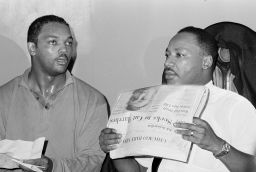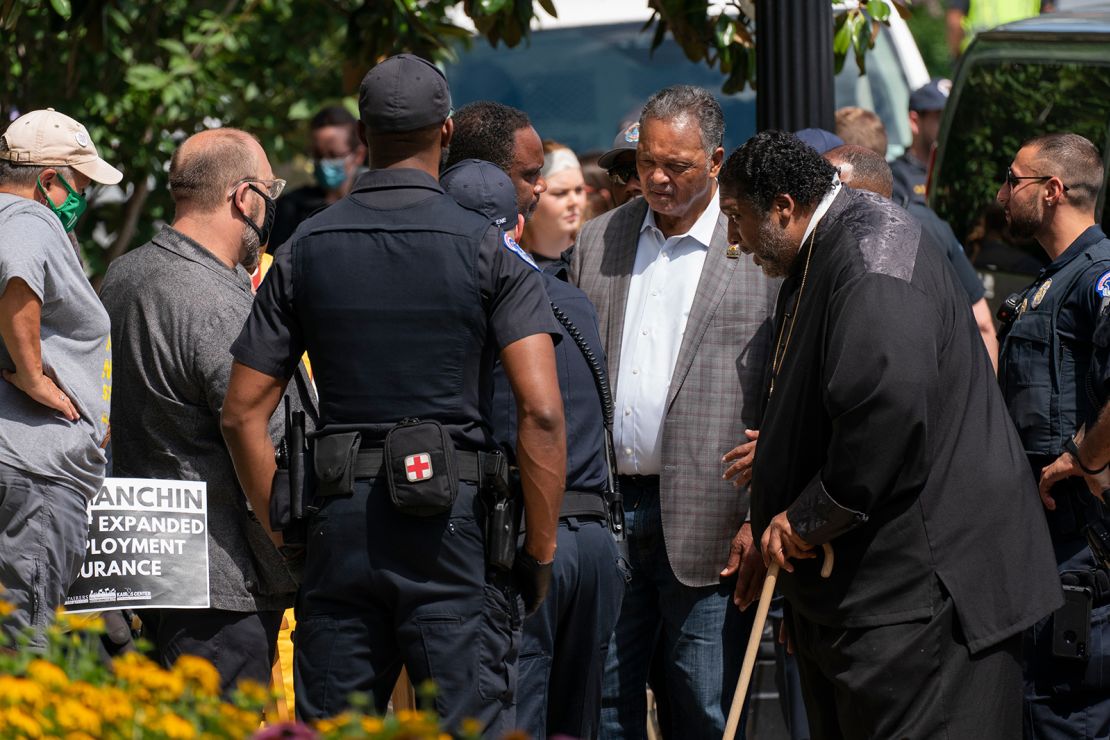The Rev. Jesse Jackson marched alongside the Rev. Martin Luther King Jr. and other Black faith leaders in Selma, Alabama, in 1965 in a push for voting rights that had been largely galvanized by the Black church.
Jackson was still a seminarian at the time, but said he understood that religious leaders had a “moral obligation” to fight for justice.
“Preachers stand up, people listen to them, they hear them and they respond,” Jackson said.
Today, Jackson is still marching and rallying for voting rights, but with a new generation of Black pastors answering to a call similar to that followed by King and other ministers in the 1960s.

This week, some of these pastors are rallying in Washington, DC, to make what some are calling the final push for Congress to pass sweeping voting rights legislation that would counter state-level voter restrictions proposed in Texas and passed in other states. The rally comes ahead of the 56th anniversary of the signing of the Voting Rights Act and on the heels of a four-day voting rights march across Texas led by Rev. William J. Barber II.
The events underscore the historic significance of Black pastors in the fight for voting rights dating back to the civil rights era when King, Jackson and minister Joseph Lowery stood at the helm. Pastors have advocated for equality from the pulpit, led protesters through neighborhoods, allowed their churches to be used as resting points for marchers and hosted training for young activists. Black ministers say it is their influence that makes them pivotal to any movement demanding equal rights.
A ‘moral consciousness’
Barber said the church has always brought a “moral consciousness” to the fight for voting rights.
“This is a critical part of pastoral work,” said Barber, who serves as co-chair of the Poor People’s Campaign. “I have to look at the people who get hurt when people steal public votes and get in office and pass public policies that hurt them.”
Barber said he expects religious leaders of all races and faiths to gather in Washington, DC, for the two-day rally that begins Monday. The events include a march to the Capitol, a meeting with the Texas Democrats who fled the state in July to block Republicans from passing voter restrictions and an evening worship service at Allen Chapel AME Church.
Barber said the church also played a key role in his Texas march last week with prominent ministers including Jackson and Bishop James Dixon, who serves as president of NAACP Houston, helping lead it. Several churches in Georgetown, Round Rock and Austin, Texas, were stops along the march.
Jackson and Barber have been arrested together at least twice in the last several weeks while rallying in Washington, DC, and Arizona for Congress to end the filibuster and pass the For the People and John Lewis Voting Rights Advancement acts. Both leaders say they aren’t deterred by police arresting them and they remain committed to lobbying for equal voting access.
“I’m going to keep marching until I can walk no more,” Jackson said. “We can turn society in the right direction if we can make a sacrifice for it.”
One historian said Black Americans have often relied on ministers to lead social justice movements because they have the ability to bring communities together during difficult times.

Dr. Keisha Blain, an associate professor of history at the University of Pittsburgh and president of the African American Intellectual History Society, said the church historically has been ground zero for faith leaders to speak out against injustice and for civil rights groups to operate.
“During the civil rights movement, churches were essential for organizations like the Student Nonviolent Coordinating Committee and the Southern Christian Leadership Conference to reach into rural communities and inspire local activists,” Blain said. “The Black ministers of today are employing many of the same tactics of religious leaders in the past.”
The power of the church
Dixon, who also leads The Community of Faith Church in Houston, said the Black church is the foundation for the fight for equality. Its leaders have also been trusted and respected voices in the Black community, he said.
Dixon pointed to King and Frederick Douglas who were both preachers who spoke from a “biblical perspective” and elevated conversations about inequality from the political space, he said.
King also founded the Southern Christian Leadership Conference in 1957 which brought together Black ministers and civil rights leaders dedicated to abolishing segregation and ending the disfranchisement of Black southerners with a nonviolent approach. The SCLC ultimately played a key role in getting the Voting Rights Act passed in 1965.
The church “has been the engine,” Dixon said. “Everything we’ve done in terms of social justice has come out of the church. There’s no doubt that the single most influential, impressive and inspiring institution in our community remains the Black church.”
Some Black church leaders say they view their advocacy for voting rights as a responsibility.
Rev. Frederick Haynes, of Friendship-West Baptist Church in Dallas, marched in Texas last week and planned to travel to Washington, DC, for the two-day rally. Haynes said the Bible makes references to fighting for justice for all people.
For this reason, it has always been a “Black faith tradition” to march, protest and be a voice for the oppressed, he said.
“Whenever there is injustice I think people of the church have a responsibility to step up and speak out,” Haynes said. “We have spent the better part of our journey trying to make this country live up to its promise especially as it relates to how it treats those who are marginalized and most vulnerable.”


